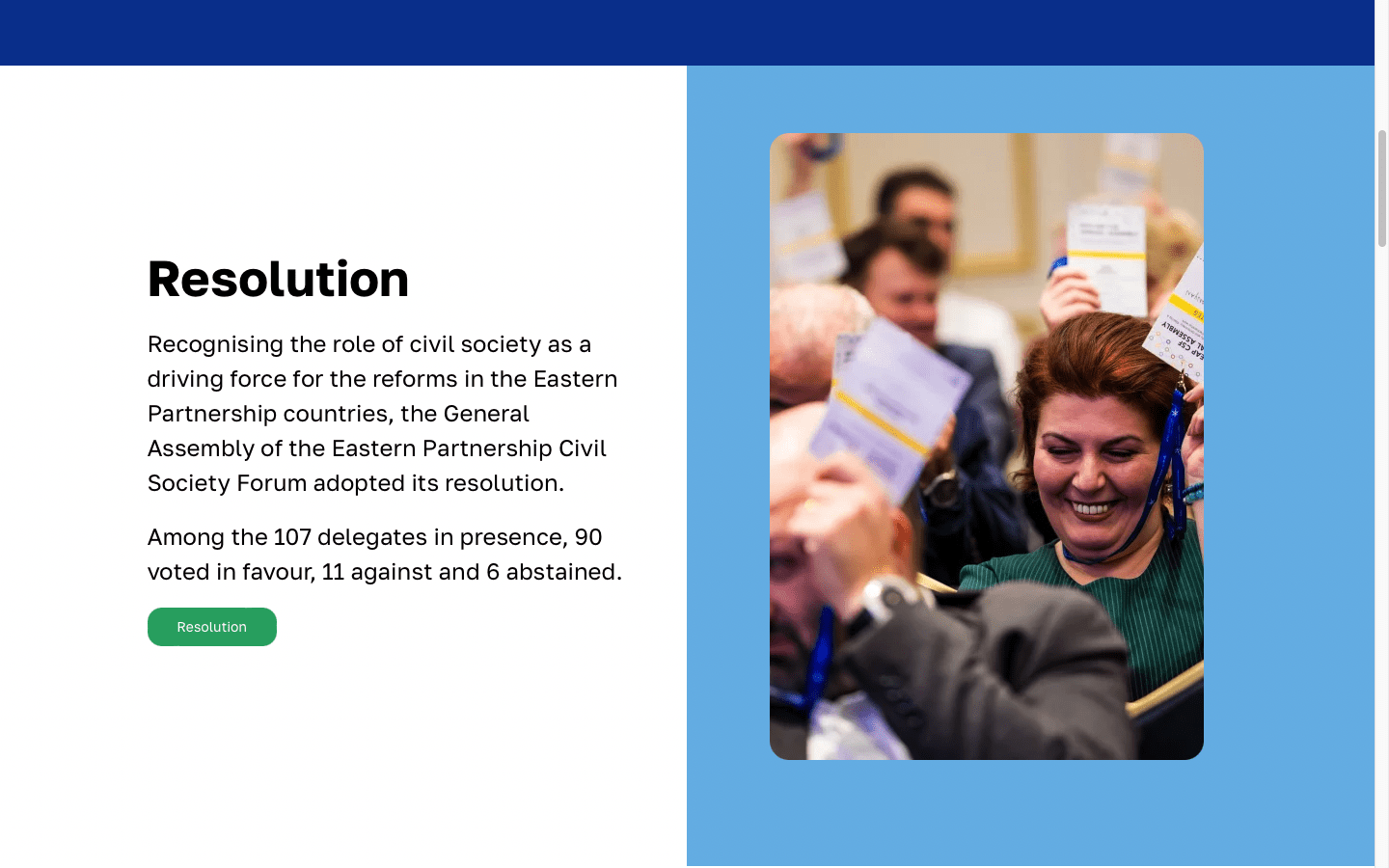Continue the Eastern Partnership policy: Read the Resolution of the EaP Civil Society Summit
The summit took place on 19-21 November in Vienna and brought together civil society representatives from Armenia, Azerbaijan, Belarus, Georgia, Moldova, Ukraine and a number of other countries. EENCE was represented at this meeting by Yuriy Petrushenko, Chairman of the Board of the East European Association for Civic Education.
Against the background of complex challenges, including the war in Ukraine and authoritarian tendencies in the region, the General Assembly of the EaP CSF adopted a resolution setting strategic guidelines for the Eastern Partnership countries.
The Summit participants called to continue the Eastern Partnership policy and to promote the role of civil society within the framework of this policy.
The renewed Eastern Partnership (EaP) policy should prioritise the broad security dimension, resilience building, information exchange and the joint response mechanism. The latter is a key means to contribute to the overall security of the EaP region and to counter disinformation-related threats.
We have compiled the main points of the resolution (which can also be read in full below).
Support for Civil Society and Reforms
The General Assembly emphasized the crucial role of civil society in the Eastern Partnership (EaP) countries as a guarantor of democratic reforms and governmental accountability. Civil society organizations actively contribute to the promotion of the rule of law, transparency, and human rights. The Assembly calls on regional governments to expand civil society’s involvement in shaping and implementing national reforms, ensuring the protection of its interests even under challenging political conditions.
The War in Ukraine and Its Consequences
Russia’s aggression against Ukraine remains the primary security threat in the region. The resolution condemns the devastating impact of the war, including humanitarian crises and human rights violations. The Assembly highlights the importance of continued support for Ukraine—militarily, financially, and in its integration into the EU. Particular attention is given to rebuilding destroyed infrastructure, advancing a green economic transformation, and engaging civil society in these processes.
A Differentiated Approach to Integration
Eastern Partnership countries display varying levels of ambition toward EU integration. Ukraine and Moldova have commenced accession negotiations, while Armenia is strengthening ties with the EU through new initiatives. At the same time, challenges related to Russian influence persist, requiring a comprehensive EU approach to supporting reforms, security, and regional development.
Shrinking Civic Space
Civil society in Azerbaijan, Belarus, and Georgia faces severe repression. Arrests of activists, media restrictions, and the introduction of restrictive laws threaten the democratic development of these countries. The Assembly calls on the international community to increase pressure on authoritarian regimes, secure the release of political prisoners, and support organizations forced to operate in exile.
Regional Cooperation and Sustainable Development
Strengthening collaboration between EaP countries and the EU remains a priority. The Assembly highlighted issues such as energy security, combating disinformation, advancing digital technologies, and ensuring economic resilience. Calls include promoting environmental initiatives, transitioning to a green economy, and fostering inclusive development for youth, women, and vulnerable groups.
Fighting Authoritarianism
The Assembly condemned the repressive actions of authorities in Belarus and Azerbaijan. It emphasized that the international community must prioritize human rights and democratic values over short-term economic interests, including energy deals. Participants called for the immediate release of all political prisoners and increased support for democratic forces.
The Role of the EU: Leadership in Advancing Reforms
The European Union remains a key partner in the region. The resolution underscores the importance of joint efforts to advance reforms, strengthen the rule of law, and promote democracy. Under the EaP program, significant focus is placed on security, environmental issues, social development, and integration with the European market.
Conclusion
The 2024 EaP CSF General Assembly resolution sets a clear course for strengthening democracy, promoting human rights, and fostering sustainable development in the Eastern Partnership countries. Amid contemporary challenges, these steps provide a foundation for long-term stability and prosperity in the region.
The Eastern Partnership Civil Society Forum has been working since 2009 to promote a democratic, peaceful and prosperous Armenia, Azerbaijan, Belarus, Georgia, Moldova and Ukraine.
The Forum cooperates with 1,200 civil society organisations in Europe and the Eastern Partnership, making it the largest platform supporting democratic transition and European integration in the Eastern Partnership countries.


